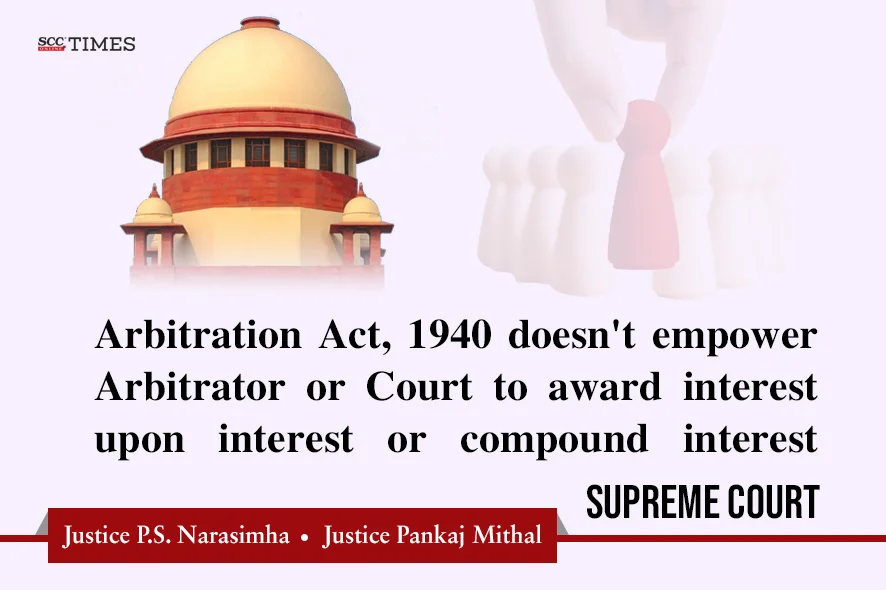Supreme Court: While considering the instant petition concerning a contract of 1984-85 between the petitioner and the respondent, where an Award came to be passed by the Arbitrator on 17-09-1997 under the Arbitration Act, 1940; the Division Bench of P.S. Narasimha and Pankaj Mithal*, JJ., pointed out the legal position that Arbitration Act, 1940 does not specifically empowers either the Arbitrator or the Court to award interest upon interest or compound interest. Furthermore, there is no other provision which provides for grant of compound interest or interest upon interest. The Court further stated that Section 34 of CPC is silent in this regard whereas Section 3(3) of Interest Act, 1978 specifically prohibits the same.
Background and Legal Trajectory:
In the 1984-85 contract between the petitioner and the respondent, the Arbitrator awarded the interest on the amount awarded. The interest was awarded on the amount of Rs. 21,56,745 i.e. for two periods (i) from the date of completion of the work up to the date of the award @ 12% per annum (simple interest); and (ii) @ 15% per annum from the date of the award till the date of its payment or the date of the court decree, whichever is earlier.
The petitioner was paid the principal amount of compensation awarded and interest of 12% and 15% for the two periods i.e. pre-award and post-award on the principal amount awarded. However, the petitioner was not satisfied, and he moved execution for the realization of certain amount as shortfall of the interest. The petitioner contended to include 12% interest in the principal amount of compensation awarded for the purpose of claiming 15% simple interest for the post-award period.
Principal Senior Civil Judge declined to grant interest upon interest since “the Arbitrator did not award it in so many words”. The Gujarat High Court adopted the same view by holding that since the Arbitrator had used word ‘simple interest’ and had not specifically awarded compound interest, therefore, the petitioner is only entitled to simple interest @ 12% per annum on the amount awarded as compensation for the pre-award period and simple interest @ 15% per annum for the post-award period only on the amount of compensation awarded.
Aggrieved by the afore-stated decisions, the petitioner preferred the instant SLP.
Court’s Assessment:
Perusing the Award in question, the Court noted that the Arbitrator had granted interest for two separate periods on the principal sum adjudged only and there was no direction that the interest for the subsequent period would be payable on the principal sum adjudged including interest for the first period. Therefore, the Court had to consider whether interest is payable on interest or whether 15% interest p.a., awarded would be on the principal sum award plus 12% p.a., interest on it for the pre- award period.
Examining the legal position under the Arbitration Act, 1940, the Court noted that S. 29 of the 1940 Act provided that in the decree, the Court cannot pass an order for payment of interest on interest but only on the principal sum adjudged.
Pointing out that the award under the 1940 Act is in the nature of a decree in terms of Section 17 of the 1940 Act, the Court stated that such an award attracts provisions of the Code of Civil Procedure (CPC). The Court pointed out that the reading of Section 34 (1) of CPC reveals that the interest is payable on the principal sum adjudged, and not on the interest part of the award.
The Court also perused the Interest Act, 1978 specifically Section 3(3), wherein it has been laid down that nothing in Section 3 which permits the court to award interest shall empower the court to award interest upon interest. “It means that ordinarily the courts are not entitled to award interest upon interest unless specifically provided either under any statute or under the terms and conditions of the contract”.
Fortified by the legal position on the issue, the Division Bench clarified that ordinarily courts are not supposed to grant interest on interest except where it has been specifically provided under the statute or where there is specific stipulation to that effect under the terms and conditions of the contract. “There is no dispute as to the power of the courts to award interest on interest or compound interest in a given case subject to the power conferred under the statutes or under the terms and conditions of the contract; but where no such power is conferred ordinarily, the courts do not award interest on interest”.
Applying the afore-stated legal position onto the award in the instant case, the Court noted that plain reading of the award in question and decree reveals that interest awarded under the award has been dissected into two parts.
The first part relates to the pre-award period from the date of the work’s completion till the passing of the award. In the first part, simple interest @ 12% per annum has been awarded on the ‘amount awarded’. Whereas the second part is the post-award period commencing from the date of the award till the satisfaction of the award, where interest @ 15% per annum has been awarded referring to the ‘amount awarded’.
The Court pointed out that the amount awarded in both the situations must be the same and cannot be two distinct amounts. The ‘amount awarded’ refers to the principal amount of compensation awarded i.e., Rs.21,56,745.
The Court further explained that the award and the decree nowhere specifically contemplated awarding 15% interest per annum on the amount awarded including the interest component i.e. the pre-award interest. “This could not have been done even otherwise as there is no provision to that effect under the relevant statutes or the contract”.
Therefore, considering the afore-stated assessment, the Court did not deem it fit to exercise its jurisdiction under Article 136 of the Constitution and the petition was dismissed.
CASE DETAILS
|
Citation: Appellants : Respondents : |
Advocates who appeared in this case For petitioner: For respondents: |
CORAM :










